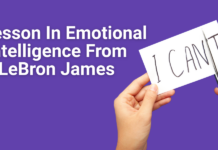
[The following is the raw transcript for a LEADx Podcast interview, which has been lightly edited for space and clarity.]
Kevin Kruse: What's your brain junk? Hello, everyone. I'm Kevin Kruse. Welcome to the LEADx Show. Today on the show we're going to be talking not just about brain junk, but also about imposter syndrome. First, today's tip is ‘fight or flight or freeze.’ It used to happen in high school to me during math tests. Now, it does happen sometimes, usually when clients are waiting, podcasts need to be recorded, I've got screaming kids in the background, and there's no time to eat a meal.
I get so overwhelmed that I literally freeze. Now, sometimes I feel hot, which is kind of ironic, so I'm freezing with a hot flash. Anyway, it's like I get hypnotized, I get shut down. I could probably just put my head down and go to sleep. I used to think that it was just me that had this sort of weird reaction sometimes, but I've learned that that classic fight or flight response, which is officially called the acute stress response, actually has a third component which is freeze. Our bodies in response to a perceived threat, our nervous system dumps hormones so that we can take action and fight back, or take action and flee, but there's a third response which kicks in when we feel it's hopeless. There's no point in fighting, and we're not going to be able to get away when we flee, so then all we do is freeze.
Now, evolutionarily speaking, playing dead wasn't a bad idea. Psychologically speaking, disassociating from something like a physical assault is actually a coping mechanism. Of course, stress these days most often occurs from just overwhelming amounts to do, and we freeze when we feel we can't do it, but it's also impossible to get it all done.
The first step in dealing with stress and anxiety is to be mindful of it, to know what's going on with our mind and body. We need to pause and observe it so we don't just fight or take flight. Realize that in response to stress, sometimes you freeze.
Our guest today is an executive coach, author and speaker who previously broke the Guinness world record title for the longest uninterrupted webcast. Now she's the host of 2Questions.tv, a show where she dives deep and gleans wisdom from her guests on a variety of topics in just two questions. She's the founder of Business in Blue Jeans and author of a book of the same name. My guest is Susan Baroncini-Moe. Susan, welcome to the show.
Susan Baroncini: Kevin, thanks for having me.
Kruse: Your book is Business in Blue Jeans. Who's this book for? What's the big message?
Baroncini-Moe: Business in Blue Jeans, in general, is for anyone who wants to start or grow a business. It's a pretty big range to be honest with you. I know it sounds counterintuitive, but I did that intentionally. I get letters from 15-year-olds in Malaysia who say, “I'm selling baked goods at my school.” Just really fun little things, that they read my book, and they're fans, and so I mention them a little bit. More than that, I hear a lot from owners of small businesses but large small businesses, like multimillion dollar businesses. The book helped them get back to basics and shore up their success by making sure they had all the right pieces in place to help them to continue to succeed. It seems like a book that would be sort of ‘the basics,’ but there's a reason behind that. There's a strong intent. It's how to have a successful business on your terms and in your own style.
It's not about what you wear. It's not about wearing jeans. I wear jeans and Yoga pants and sometimes pajamas, but it's not how to start a business. It's how to grow, so you can read this book anywhere you are in your journey. You might go, “Oh, it's so basic,” but there's a good chance you need to hear it again because anytime you approach something with, “I know that already,” you're not open to learning, you're not open to hearing. The book is intentional and definitely helps people get back to that foundational place.
The big message is that anyone can start a business and grow it to success if you have the right tools, strategies and systems in place, and hopefully, Business in Blue Jeans provides a lot of those in a very practical way.
Kruse : Give me a specific example of how has someone implemented some of your tools or systems to help them launch quickly to or sustain the success they're already having?
Baroncini-Moe: When I wrote the book, my business was very different than it is now. Primarily we did everything for business owners. We would look at a business and say, “Okay, you need a new website. We'll do that. You need new social media platforms. We'll do that. You need this marketing strategy. We'll do that.” Over time, I realized that it's actually the first chapter that is the most important. I knew that when I wrote the book, that brain junk is the most important piece, and really that's at the heart of most of my training, is in helping people to contend with their brain junk. That's all those little voices in our heads, the ideas that we have about what we're capable of, what we can achieve, how big our businesses can grow, and what we want in life.
I've had quite a few clients who have read the book and said, “It's that chapter that I need the most help with. I can do sales, I can do marketing, I can do branding. That's really, that's the easy part. I can hire people to do that, but I need someone to get inside my head and do the deep work with me and help me to figure why this is happening, or why that is happening, or why I'm always afraid the next client won't come.” That's the work that I do now. We've kind of let go of all the other work. There are lots of wonderful companies that do all those other things for you, but the biggest thing that I do now is to help executives and business owners to get rid of their brain junk and to move forward in their business without fear and hesitation and uncertainty.
Kruse : I like that term, ‘brain junk.’ All this stuff that's in our head. Do you see common patterns? Is it more about overconfidence, imposture syndrome, or stress? What do you commonly see out there?
Baroncini-Moe: Overconfidence is a rarity. Usually when you see that in people it’s masking imposture syndrome. Imposture syndrome is rampant. I find that the more successful people are and the smarter they are, the more they have it. There's a lot of fear in business owners around, “What if the next customer doesn't walk through the door? What if that next client doesn't come? What if this doesn't work? What if I fail? What if I can't keep people working?” Because a lot of us employ people, and we have mouths to feed. I think those are the big fears that come up again and again. The other thing is this sort of general ‘soft skills’ category where people just need some help in communication and really leading effectively. Learning how to not micromanage and delegate effectively.
Kruse : Any tips on those fears? If I'm fearing that I'd lose investors money. I'm fearing that this isn't going to work out. I'm going to have to lay people off. Is it more about just acknowledging that and managing it, or are there other ways to deal with it?
Baroncini-Moe: Well, both. Because in some respects we have this idea we're not supposed to be scared. When we look at other people and we see how confident they seem, we think they're not scared, but that's all a façade. It's a lie. We're all scared. Everyone's scared of something. Courage isn't really the absence of fear. It's the mastery of fear. In some ways, we can manage that fear in a really intelligent way, in a really in-depth way by doing the work. In other ways, we can erase the fear just by doing some of that deep coaching work. It's kind of both. It's getting rid of what we can and managing the rest.
Kruse: That's interesting. I worked for a guy for a few years who did not fear going bankrupt and having to fire hundreds of people. He was the founder and CEO. He told me, “Kevin,” He said, “This is America. What's the worst that happens? Everyone goes and gets unemployment? The poorest people in this country are so much better off than the worst people in other places. It wouldn't be so bad if we all lost our jobs.”
Baroncini-Moe: Wow.
Kruse: He took that company to the brink of bankruptcy several times. That made me nervous working for him.
Baroncini-Moe: It should.
Kruse: It's like I want my boss to fear that she might have to let me go some day, or fear that she's going to let her investors down, because that means you care. Right?
Baroncini-Moe: Absolutely.
Kruse: It's a little scary if you don't care about those things.
Baroncini-Moe: Well, I think that the part of the job of a good leader is to inspire confidence in their team. You don't want to be saying, “I don't care if you lose your jobs.” That makes your team nervous like it made you nervous, and you want to be instilling and inspiring confidence, and encouraging them to do more because you're willing to go to bat for them. You're willing to do more for them. Great leaders care about whether or not they're going to lose. Yeah, I think great leaders care about whether or not they're going to lose jobs.
Kruse: Yeah.
Baroncini-Moe: Sorry, Kevin's former boss.
Kruse: We shouldn't have to say it, but actually it does matter. I think all of us, as individual contributors, or when we are joining a larger company, should join with a realistic perspective. If I'm joining a startup, there could be more risks there than a more established company. These days I think everybody is at risk. The days of working for one employer or IBM not doing layoffs, those days are gone. Still, you should probably know what you're getting into as well.
Baroncini-Moe: I agree. I think it's a little sad though. I think that was a special relationship, and I think companies that remember that and remember that time and want to keep employees and do a lot to retain them, do well. I think employees who want to say with a company–I mean, I think we all still wish for that. It's just different now. I think it doesn't have to be.
Kruse: I think employee engagement sort of took a big nose dive. That was 40-plus years ago and it has never really recovered. It's sort of coincides with this shift where all of a sudden around the world nobody's job was secure anymore. Not only could you be laid off, but even if you were in a good job, the idea of pensions all went away. This is what gets me angry, is that a lot of people are bashing Millennials and making these generalizations. One of the ones I hear a lot is that Millennials have no loyalty, and they'll job hop. They're going to have a million jobs by the time they're 40. It's like, they've seen you fire their parents over and over again.
Baroncini-Moe: Yeah, it goes both ways.
Kruse: It goes both ways. I think, to your point, Susan, if you care a lot about your employees, then you're going to do things that hopefully make them want to stay. You're going to help them to grow. You're going to show appreciation. You're going to give them that future vision, or you're going to bring meaning to their work. If you don't, then shame on you if they go somewhere else.
Baroncini-Moe: Exactly, exactly. Well, that's your area. Isn't it? You know a ton about that.
Kruse: I pretend to. You know, imposture syndrome. It's like, when are they going to discover me, Susan? I don't actually know anything about that stuff.
Susan Baroncini: Kevin, don't make me coach you right now.
Kruse: I could probably do an entire season of episodes of me just being on a couch and having all my guests just shrink me. I'm sure it would be good. Anyway, I like to end our episodes with something really actionable. I'm always challenging our listens like, “Go do one little thing. Make yourself 1% better today.” We've touched on a lot of things already, but is there something specific you would want us to try or think about or to take action on today?
Baroncini-Moe: Read a book.
Kruse: Good.
Baroncini-Moe: Go read a book. Read a really good book. It doesn't even matter. It can be fiction, it can be nonfiction, but do something to get you away from the screens and onto the printed word. I am a big fan of actual, tangible books, and I encourage everyone just read a book.
Kruse: Love it. Got any favorites you've been reading lately?
Baroncini-Moe: I've read a lot lately. My favorite book recently was The Longevity Plan by Dr. John Day. It's about this community in China where they have the most dense population of centenarians on the planet, and it's a wonderful book.
Kruse: I bet you've already adopted their behaviors and diets. What are the highlights?
Baroncini-Moe: You know what? Kevin, I will tell you I interviewed him for my show, and I got to tell him that I had tried this soup, the longevity soup, because I read the book and I was inspired. I went out and bought the ingredients and I made the soup. I thought it was going to be terrible. It was a funny color, but it was all right.
Kruse: Well, I'll definitely read that book. I like to tell me that my diet is about 90% vegan and 10% Superbowl party, so I'm not pure on my diet by any means.
Baroncini-Moe: It's true. You will love that book then. You will love that book.
Kruse: All right. I'm going to hop on Amazon. Susan, how can our listeners find out more about you, your company, and your own book?
Baroncini-Moe: It depends on what you're looking for. My book you can find on Amazon and all major bookstores, and some minor ones. You can always go to my website, BusinessInBlueJeans.com, to find me. If you're looking for an executive coach, SusanBaroncini-Moe.com.
As you know, I'm doing a new YouTube showed called 2Questions.TV, which is all about success in all facets of your life including business and leadership, career, personal development, health development and stuff like that. The shtick is I'm only allowed to ask two questions. I'm interviewing you this next week. I'm not sure exactly what your date is. If you want to find that, folks can just go to 2Questions.tv. Type that in as the domain name. It will take you right to the show.
Kruse: That's great, Susan. I encourage our listeners to check that out. I've been like my teenage kid spending more time on YouTube, and I think the world is moving to a video format, so I was very intrigued by 2Questions.tv, and I'm going to spend more time on it myself. Until then, listeners, take action, read a book, and follow up with Susan. All of those links, of course, will be in the show notes. Susan, thanks for coming on to the LEADx Show.
Baroncini-Moe: Thanks for having me. It was so much fun.
—
Kevin Kruse is a New York Times bestselling author, host of the popular LEADx Leadership Podcast, and the CEO/Founder of LEADx.org, which provides free world-class leadership training, professional development and career advice for anyone, anywhere.





